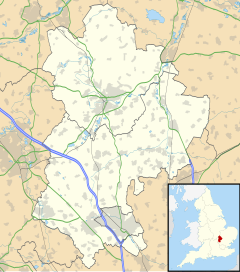Eyeworth
| Eyeworth | |
|---|---|
 All Saints Church, Eyeworth |
|
| Eyeworth shown within Bedfordshire | |
| OS grid reference | TL248455 |
| Unitary authority | |
| Ceremonial county | |
| Region | |
| Country | England |
| Sovereign state | United Kingdom |
| Post town | SANDY |
| Postcode district | SG19 |
| Dialling code | 01767 |
| Police | Bedfordshire |
| Fire | Bedfordshire and Luton |
| Ambulance | East of England |
| EU Parliament | East of England |
| UK Parliament | |
Eyeworth (also Eyworth) is a village and civil parish located in east Bedfordshire, England, around 5 miles north east of Biggleswade.
It is now part of the parish of Sutton and Eyeworth which had a combined population of 385 in 2001, of which 86 were estimated to be part of Eyeworth itself. It is in the civil parish of Sutton
Despite its small size Eyeworth is mentioned in the Domesday Book. The majority of the houses are Victorian, though the seventeenth century Church Farm still remains.
The widow of Francis Bacon, née Alice Barnham, lived in Eyeworth following his death, and she died there in 1650. There were a number of minor skirmishes in the parish during the Civil War and it is reputed that Oliver Cromwell visited the village and damaged some of the church's icons. Notable residents include Sir Peter Kendall, ex President of the National Farmers Union, who farms the land around the village with his brother Richard.
The village is home to a medieval church dedicated to All Saints whose current building dates back to the fourteenth century and is partly constructed from Totternhoe stone. The church's fifteenth century spire was destroyed by lightning in 1967 and after the subsequent theft of the lead from its roof was replaced by a much smaller modern turret.
The interior houses a number of medieval brasses and monuments to Sir Edmund Anderson (d.1605), founder of the Anderson line who were lords of the manor, and who was also a judge during the trial of Mary, Queen of Scots.
...
Wikipedia

